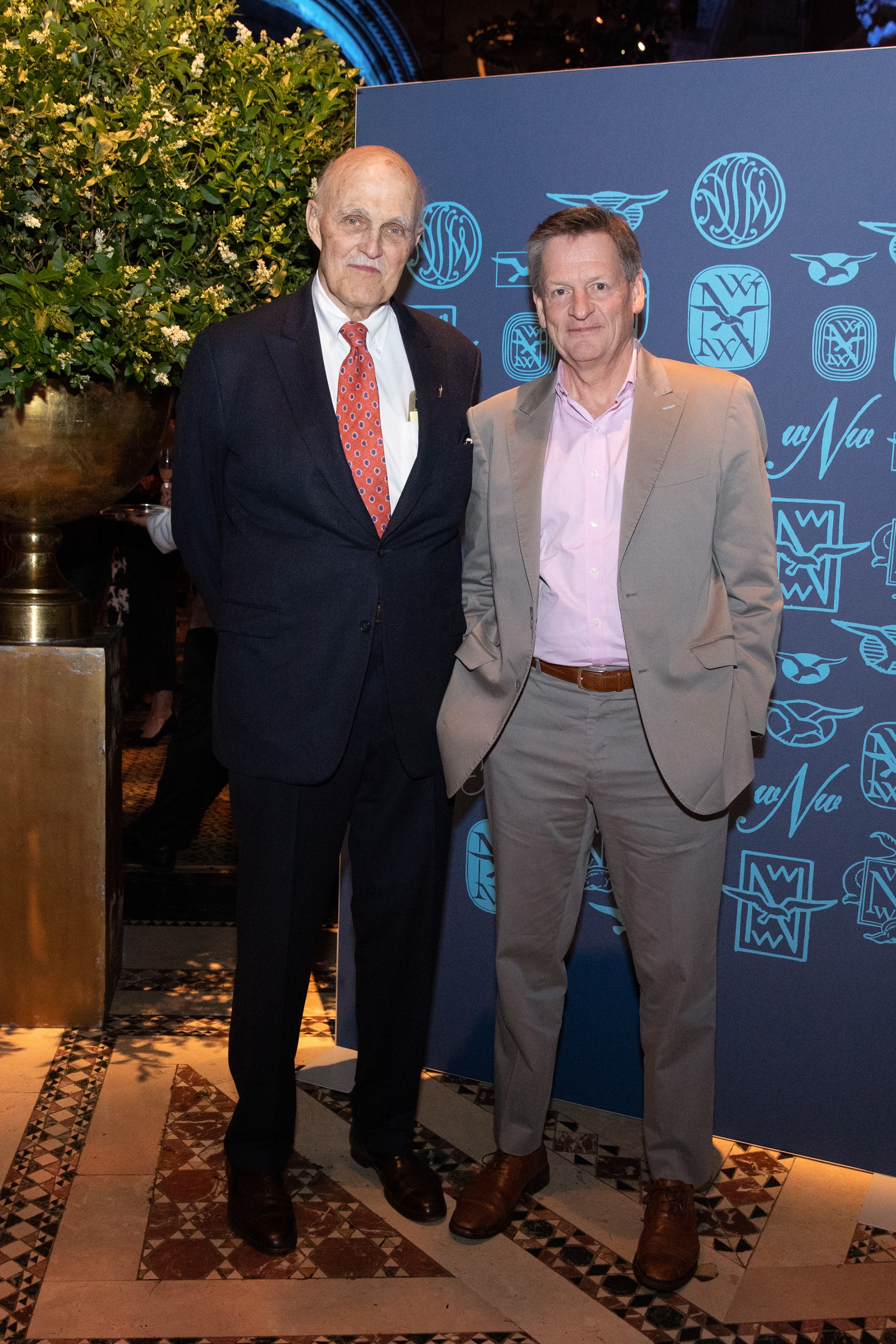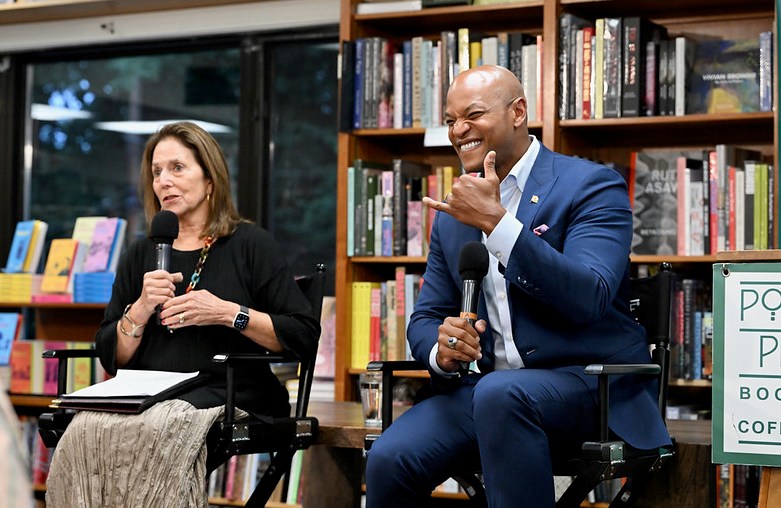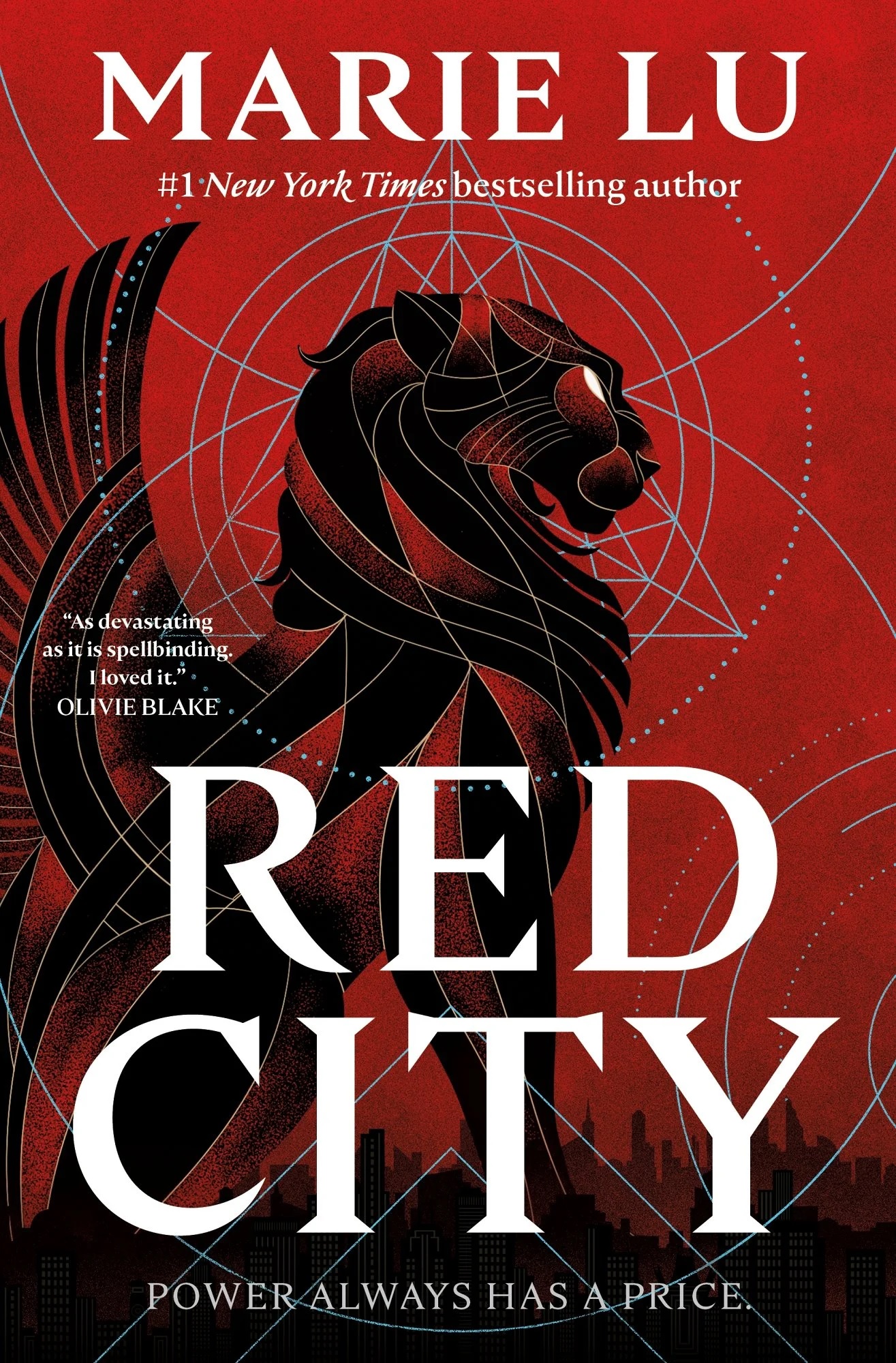 |
Starling Lawrence with Michael Lewis at Norton’s centenary celebration in 2023.
(credit: Hechler Photography) |
Starling Lawrence, longtime editor at W.W. Norton & Company, died yesterday after a short illness. He was 82.
Lawrence edited "scores of era-defining books in his 55-year career" at Norton, the company wrote. He began as an assistant to Evan Thomas and only a decade later was elected a vice-president and director. In 1989, he was named executive editor of the trade department. He became editor-in-chief in 1993 and vice-chairman in 2000. He was editor-at-large at his death, most recently working on books by David Ignatius, Michael Lewis, and David McCloskey.
"It is impossible to overstate the effect Star Lawrence has had on Norton," chairman and president Julia Reidhead said. "His taste was as confident and true as his spirit, and he transformed our list with some of the greatest writers of our time. And beyond this, through gestures both large and small, he wove generations of his Norton colleagues into a family."
"Unlike traditional Norton editors, who tended to hit the book equivalent of singles, Star would swing for the fences and aim at home runs," said Don Lamm, former chairman and president.
"Starling Lawrence was not only the most successful trade editor in the 100-year history of our firm, as editor-in-chief he led the trade department in a period of unparalleled growth," said Drake McFeely, former chairman and president. "Until Star took charge, the trade department enjoyed the occasional bestseller. In the Lawrence era, the department came to depend upon its regular bestsellers and they, in turn, lifted the rest of the distinguished list."
Lawrence had what the company called "an unmatched impact on the trade list, shaping its character with culturally important books that sold millions of copies. Lawrence discovered future bestsellers in unlikely places: the slush pile of unsolicited manuscripts, the dusty top shelf of an agent's bookcase, and in proposals rejected by the rest of the industry."
His major nonfiction bestsellers include Ann Rule's The Stranger Beside Me; Burton G. Malkiel's A Random Walk Down Wall Street; and Sebastian Junger's The Perfect Storm, which he acquired for $35,000 after reading Junger's Outside magazine article about the devastating North Atlantic storm. "He saw something really crucial to the ease of reading that book," said Junger, who credited Lawrence in the New York Times for helping him blend the narrative's multiple storylines.
He acquired Michael Lewis's Liar's Poker and went on to edit 17 books by Lewis, including Moneyball, The Blind Side, The Big Short, and Going Infinite. The two first met in 1987 to talk about Lewis's idea of writing a history of Wall Street. The publisher said: "At the time, the young writer imagined a tame book; the result was far from the idea he first proposed. Lewis recalled, 'Between the time Star bought Liar's Poker and the time I finished it, he'd teased out of me a memoir of my time at Salomon Brothers that scandalized Wall Street and made me persona non grata there for nearly a decade.' "
On the fiction side, Lawrence acquired U.S. rights to Patrick O'Brian's 21-volume Aubrey-Maturin series, better known by the first title in the series, Master and Commander. He learned of the books when he borrowed two of the titles "from a London agent's bookshelf for his flight back to New York," Norton wrote.
Other authors Lawrence published include Susan Wise Bauer, Vincent Bugliosi, Nicole Krauss, Mary S. Lovell, Robert McCrum, Michael Ondaatje, Graham Robb, Mary Lee Settle, Victoria Shorr, Ali Soufan, Ian W. Toll, and A.N. Wilson.
In his early years as an assistant in charge of reading the slush pile, Lawrence found, as he later recounted, "a first novel, The Lasko Tangent, by Richard North Patterson, who went on to write many legal bestsellers; a first novel by James Grady, Six Days of the Condor, which was the basis of a film starring Robert Redford called Three Days of the Condor; and a very lively and useful guide to personal finance by a rising star in the Princeton economics department, Burton Malkiel. It was called A Random Walk Down Wall Street; it is now a backlist staple of both our trade and college departments."
In his 50s, he began writing, and published four works of fiction: a story collection called Legacies and the novels Montenegro, The Thief of Words, and The Lightning Keeper.
Brendan Curry, director of the trade group said, "As an editor, Star stood alone. In a business consumed by fads and fashions, he dedicated himself to what, as he said, was 'on the page.' As a colleague, he was as likely to drop a clutch of kale from his garden on your desk as he was to drop a manuscript.
"He couldn't care less who your parents were or where (or whether) you went to school. He wanted to know what you thought about the world and what books you wanted to see in it. And if by chance you passed the conference room at the right moment, you would be summoned to sit while he made you a tomato-and-cucumber sandwich. He was the rarest combination of exacting taste and enormous generosity, and I will miss him."
 The shop is hosting a ribbon-cutting ceremony today, August 22, to celebrate the relaunch with exclusive deals, a "bring a book, take a book" swap, and complimentary coffee and cookies.
The shop is hosting a ribbon-cutting ceremony today, August 22, to celebrate the relaunch with exclusive deals, a "bring a book, take a book" swap, and complimentary coffee and cookies.






SHELFAWARENESS.1222.T1.BESTADSWEBINAR.gif)

 HarperCollins plans to build "a state-of-the-art supply chain logistics facility" in Brownsburg, Ind., an Indianapolis suburb. Scheduled to open in 2028, the 1.6-million-square-foot warehouse will use "the most advanced technology available to improve efficiency, enhance fulfillment accuracy, reduce waste, and increase visibility and control over the supply chain."
HarperCollins plans to build "a state-of-the-art supply chain logistics facility" in Brownsburg, Ind., an Indianapolis suburb. Scheduled to open in 2028, the 1.6-million-square-foot warehouse will use "the most advanced technology available to improve efficiency, enhance fulfillment accuracy, reduce waste, and increase visibility and control over the supply chain."
 Waterstones is opening 10 new stores per year in the U.K. and is "considering new kinds of locations, from inside department stores to parts of the country where it is less well known, such as Northern Ireland and Scotland," the Guardian reported, adding that the chain "is enjoying
Waterstones is opening 10 new stores per year in the U.K. and is "considering new kinds of locations, from inside department stores to parts of the country where it is less well known, such as Northern Ireland and Scotland," the Guardian reported, adding that the chain "is enjoying  Congratulations to
Congratulations to  Bookshop.org and Two Trees Press, publisher of Among Friends: An Illustrated Oral History of American Book Publishing and Bookselling in the 20th Century, have
Bookshop.org and Two Trees Press, publisher of Among Friends: An Illustrated Oral History of American Book Publishing and Bookselling in the 20th Century, have 


 "
" Posted on Instagram by
Posted on Instagram by 
 Book you've bought for the cover:
Book you've bought for the cover: The drug Sand can perfect everything; it is the secret to how Alchemists have been able to run society from the shadows, unnoticed by most normal people. Ari and Sam, however, are not most people, though neither of them knows their potential when they're singled out and plucked from obscurity by competing Alchemist factions, Grand Central and Lumines, in
The drug Sand can perfect everything; it is the secret to how Alchemists have been able to run society from the shadows, unnoticed by most normal people. Ari and Sam, however, are not most people, though neither of them knows their potential when they're singled out and plucked from obscurity by competing Alchemist factions, Grand Central and Lumines, in 